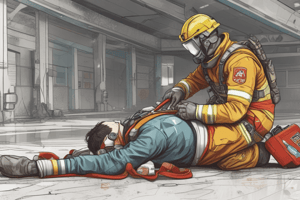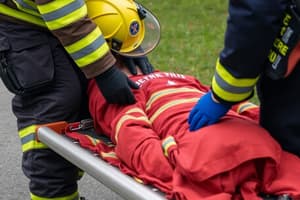Podcast
Questions and Answers
Explain the broad functions of the criminal justice system in relation to ensuring victim and societal protection from crime.
Explain the broad functions of the criminal justice system in relation to ensuring victim and societal protection from crime.
The broad functions of the criminal justice system include ensuring that victims and society are protected from crime. This is achieved through retribution and deterrence (punishment), incapacitation (public protection), rehabilitation (changing behaviors), and compensation (restitution). These functions are carried out through arrest, prosecution, and imprisonment.
What are the concerns regarding the immediate safety of victims within the criminal justice system?
What are the concerns regarding the immediate safety of victims within the criminal justice system?
Concerns regarding the immediate safety of victims are often neglected, even when a suspect has been arrested. Survivors are vulnerable to intimidation, assault, or murder by the accused on bail or the accused's family and friends.
What are some victim protection measures mentioned in the text?
What are some victim protection measures mentioned in the text?
Some victim protection measures include shelters or 'refuges' that provide safe and temporary dwellings for women exposed to repeated violence in their homes. Additionally, the Domestic Violence Act provides for victims to be granted protection orders, prohibiting domestic violence and other actions such as entering the victim’s place of work or residence.
What are the learning outcomes related to the criminal justice system and victim protection mentioned in the text?
What are the learning outcomes related to the criminal justice system and victim protection mentioned in the text?
Explain the purpose of witness protection programmes in the criminal justice system.
Explain the purpose of witness protection programmes in the criminal justice system.
What is the Witness Protection Act 112 of 1998?
What is the Witness Protection Act 112 of 1998?
What are some methods used to protect witnesses in the criminal justice process?
What are some methods used to protect witnesses in the criminal justice process?
What are the duties of investigating officers in assisting victims of sexual and gender-based violence (SGBV) cases?
What are the duties of investigating officers in assisting victims of sexual and gender-based violence (SGBV) cases?
Explain the role of the Family Violence, Child Protection & Sexual Offences Unit (FCS) in handling sexual offences cases.
Explain the role of the Family Violence, Child Protection & Sexual Offences Unit (FCS) in handling sexual offences cases.
What are the main services provided by Thuthuzela Care Centres to rape victims?
What are the main services provided by Thuthuzela Care Centres to rape victims?
What are the central services provided to victim support in the criminal justice system?
What are the central services provided to victim support in the criminal justice system?
What factors increase the vulnerability of victims and witnesses in the criminal justice system?
What factors increase the vulnerability of victims and witnesses in the criminal justice system?
What are the key offences for which a witness or related person may be placed in the Witness Protection Programme?
What are the key offences for which a witness or related person may be placed in the Witness Protection Programme?
What is the duty of police officers in providing medical assistance to survivors of sexual and gender-based violence (SGBV) cases?
What is the duty of police officers in providing medical assistance to survivors of sexual and gender-based violence (SGBV) cases?
Explain the significance of the use of CCTV cameras during trials in the protection of witnesses.
Explain the significance of the use of CCTV cameras during trials in the protection of witnesses.
What is the aim of the establishment of Sexual Offence Courts (SOC’s) in the criminal justice system?
What is the aim of the establishment of Sexual Offence Courts (SOC’s) in the criminal justice system?
What are some factors that influence the traumatic nature of interaction with the criminal justice system (CJS)?
What are some factors that influence the traumatic nature of interaction with the criminal justice system (CJS)?
What are the responses to vulnerable categories of witnesses in the criminal justice system (CJS)?
What are the responses to vulnerable categories of witnesses in the criminal justice system (CJS)?
What are the problems with responses to vulnerable categories of witnesses in the criminal justice system (CJS)?
What are the problems with responses to vulnerable categories of witnesses in the criminal justice system (CJS)?
What does the South African Law Reform Commission suggest regarding vulnerable witnesses?
What does the South African Law Reform Commission suggest regarding vulnerable witnesses?
What is the core purpose of the criminal justice system (CJS)?
What is the core purpose of the criminal justice system (CJS)?
What is the most important form of evidence in the modern criminal justice system (CJS)?
What is the most important form of evidence in the modern criminal justice system (CJS)?
What are the duties of the criminal justice system (CJS) regarding witness needs?
What are the duties of the criminal justice system (CJS) regarding witness needs?
What functions does the criminal justice system (CJS) have in addressing witness needs?
What functions does the criminal justice system (CJS) have in addressing witness needs?
What are some concerns about witness needs in the criminal justice system (CJS)?
What are some concerns about witness needs in the criminal justice system (CJS)?
What does the criminal justice system (CJS) rely on to secure convictions against perpetrators and to ensure innocent people aren't wrongfully charged and convicted?
What does the criminal justice system (CJS) rely on to secure convictions against perpetrators and to ensure innocent people aren't wrongfully charged and convicted?
What is the significance of the key witness in the criminal justice system (CJS)?
What is the significance of the key witness in the criminal justice system (CJS)?
What are the influencing factors that add to the traumatic nature of interaction with the criminal justice system (CJS)?
What are the influencing factors that add to the traumatic nature of interaction with the criminal justice system (CJS)?
Flashcards are hidden until you start studying
Study Notes
Victim Safety – Protection Against Violence & Intimidation
- The criminal justice system's broad function is to ensure that victims and society are protected from crime.
- The system's goals include retribution and deterrence (punishment), incapacitation (public protection), rehabilitation (changing behaviors), and compensation (restitution).
- Concerns regarding the immediate safety of victims are often neglected, even when a suspect has been arrested, survivors are vulnerable to intimidation, assault, or murder by the accused on bail or the accused's family/friends.
Protection Measures
- Shelters or "refuges" provide a safe and temporary dwelling for women exposed to repeated violence in their homes.
- The Domestic Violence Act provides for victims to be granted protection orders, prohibiting domestic violence and other actions such as entering the victim's place of work or residence.
Witness Protection
- Witness Protection Programmes safeguard witnesses before, during, and after criminal trials.
- The purpose is to protect witnesses from efforts by the perpetrator (or their associates) to prevent/discourage victims or witnesses from participating in the CJ process through violence, threats, or other coercive measures.
- The Witness Protection Act 112 of 1998 established the Witness Protection Programme, which provides temporary protection, support, and related services to vulnerable and intimidated witnesses and related persons.
Medical Assistance and Advice, Emotional Support & Trauma Counselling
- In rape cases, medical assistance includes the administration of antiretroviral drugs to prevent HIV.
- Police officers have a duty to inform SGBV survivors about the importance of obtaining PEP and may also apply to the magistrate's court to order the offender to undergo an HIV test.
- Family Violence, Child Protection & Sexual Offences Unit (FCS) provides victims with a private and secure environment for interviews, recording complaints, and expediting investigation procedures.
Vulnerable Victims & Witnesses
- Witnesses experience the same hardships as victims during their engagement with the CJS, amplified by intimidation and secondary victimisation.
- Factors that increase vulnerability of victims include circumstantial factors, witness's relationship with the defendant, and personal characteristics or qualities.
Needs of Witnesses
- The core purpose of the CJS is to hold perpetrators of crime accountable for their actions, relying on factual and truthful evidence from witnesses.
- To make effective use of witness evidence, the CJS needs to work in a way that is responsive to witnesses, including improving practice regarding the first contact with and identification of witnesses by the police.
- Engaging with diversity issues relating to witnesses, such as language and religious observances, and providing information and communication with witnesses.
Studying That Suits You
Use AI to generate personalized quizzes and flashcards to suit your learning preferences.




